




 |
   |
 |
 |
What the Sea Wants, the Sea Will Have (2006, 48.20) ***/T |
|
| For You The Garden's End {Explain} The Albatross Planet New Year Amazing Things Always on This Line The Woman By the Well |
Hammer Queen of Apology Showstopper I Could Never Belong to You |
|
Current availability:
Mellotron used:
Sarah Blasko is an Australian of East European heritage, echoes of which can be found in her work. Her second album, 2006's What the Sea Wants, the Sea Will Have, contains an eclectic mixture of styles, veering between creepy (in a good way) opener For You, the touching-on-goth The Garden's End, the is it/isn't it upbeat pop of Planet New Year and the sad, wind-blasted balladry of closer I Could Never Belong To You, although in actuality, no one track really sounds like any other.
Jim Moginie (of Midnight Oil and Fuzz Face fame) and Robert F. Cranny both play Mellotron, with a strange male vocal sound that must be Mellotronically-produced on {Explain}, very obvious flutes on Always On This Line and what sounds like a single flute chord on Hammer, although it's quite possible it appears elsewhere, too. Sarah Blasko's far more original than most current female singer-songwriters, although comparisons with all the usual suspects stand up; What the Sea Wants... isn't a bad record at all, although I imagine it will take some listens to really appreciate. Not much obvious Mellotron, but that's hardly why you'd buy this, anyway.
See: Samples etc.
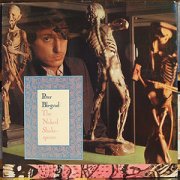 |
The Naked Shakespeare (1983, 40.37) ***/½ |
|
| How Beautiful You Are Weird Monkeys Naked Shakespeare Irma Like a Baby Powers in the Air You Can't Miss it Karen |
Vermont Lonely Too Blue Eyed William First Blow Struck |
|
Current availability:
Mellotron used:
American guitarist Peter Blegvad was a member of German/British avant trio Slapp Happy, subsequently merging with Henry Cow, moving on to a solo career (including various collaborations) by the beginning of the '80s. 1983's The Naked Shakespeare was his first solo effort, showing a rather clear XTC influence; hardly surprising, as that outfit's Andy Partridge produced almost throughout. Unfortunately, its recording coincided with the rise of nasty '80s production (XTC were far from exempt themselves), giving the impression that the album possibly wasn't quite what Blegvad was actually after; you can imagine tracks like opener How Beautiful You Are and Vermont easily slotting onto contemporaneous XTC albums.
Partridge plays (presumably) XTC's Mellotron on Powers In The Air, with a descending choir part, well in the background, so you're really not going to track this one down for its Mellotron content. Overall, then, a quirky, post-'noo wave' effort from someone whose work is mostly less mainstream (I use the term advisedly). Has its moments, but generally speaking, a slightly unsuccessful experiment.
See: XTC | Andy Partridge
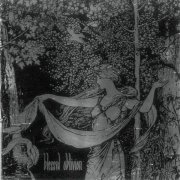 |
Blessed Oblivion (2001, 42.33) ***/T½ |
|
| Breathing of Leaves Darkest Skies Slipaway Pathology of Roses Je Ne Sais Quoi Still Searching Je Ne Sais Quoi II Aetherium |
Last Vestige Ananda |
|
Current availability:
Mellotron used:
Blessed Oblivion are yet another Ventricle label project (Mauve Sideshow, Angel Provocateur, Steeple of Fyre, others), this one slotting into their patented 'ethereal female vocals' range, albeit with a handful of instrumental tracks, all ambient synths; imagine the original meaning of 'industrial' without the industry. Picking out individual tracks is pointless; this is an album clearly made to listen to in one sitting.
Lee "Dusty Lee" Blair does his usual Mellotron thing here, with drifting strings on Je Ne Sais Quoi and volume-pedalled ones on Aetherium and Last Vestige, all as ethereal as we've come to expect from the label. Not exactly rock'n'roll, then, more a new definition of 'ambient'.
 |
Nico (1996, recorded 1991-95, 38.37) **½/T |
|
| The Pusher Hell Soup No Rain (Ripped Away Version) Soul One John Sinclair All That I Need Glitch |
Life Ain't So Shitty Swallowed Pull St. Andrew's Hall Letters From a Porcupine |
|
Current availability:
Mellotron used:
Blind Melon were supposedly the 'Seattle' band of the early '90s (actually based in L.A.) who were more influenced by what has irritatingly come to be known as 'classic rock' than their contemporaries. After a slow start, a memorable video propelled their debut, Blind Melon, to multi-million selling status, despite its (to my ears, anyway) relative lack of musical content. The darker Soup fared less well, after which their charismatic but heavily substance-abusive singer, Shannon Hoon, died on their tour bus. Probably not his greatest career move. Or maybe it was.
The largely acoustic Nico (named for Hoon's young daughter, named for...) seems to be the final word on the band, pieced together after Hoon's death from various unfinished sessions, demos etc. and is about as 'bitty' as you'd expect from such a project, although all power to the band for making this stuff available for their fans. I'd forgotten just how much Hoon's squeaky voice irritates me; at least track-by-track credits means I can skip most of most tracks, only listening to the Mellotron ones in full. No Rain (Ripped Away Version) is a different version of the hit-with-that-video-with-its-title-bizarrely-inspired-by-a-crowd-chant-at-Woodstock and has a few seconds of high-pitched Mellotron strings from drummer Glen Graham, while the conga-heavy Glitch has strings and cellos, played by Graham and guitarist Christopher Thorn.
Well, if you like Blind Melon, you'll probably like Nico, but then you've probably got it already. If you don't, you won't and you probably haven't. I don't, I don't and I haven't, which rather proves my point, I think. A couple of listenable tracks (Glitch and possibly the more electric Swallowed), one with a decent Mellotron part, doth not a decent album make. Buy strictly only according to taste.
 |
Blink-182 (2003, 47.52) **½/T½ |
|
| Feeling This Obvious I Miss You Violence Stockholm Syndrome Down The Fallen Interlude Go |
Asthenia Always Easy Target All of This Here's Your Letter I'm Lost Without You |
|
Current availability:
Mellotron used:
Blink-182 began in the early '90s as a pop-punk outfit, ending up rivalling Green Day and No Doubt for record sales; Blink-182 is their fifth album and last before the band took a several-year hiatus. Dropping their previous penchant for toilet humour, the album showcased a 'new, mature' Blink and, as a result, is rather on the dull side. I think you've got to be in your teens to really get this stuff, which locks me out in no uncertain terms; it seems to be OK at what it does, but what it does isn't very interesting.
Roger Manning (Jellyfish, Moog Cookbook) guests on keys, including an interesting backwards piano on Stockholm Syndrome. He plays (uncredited) Mellotron on two tracks, with volume-pedalled strings on The Fallen Interlude and a nice polyphonic cello part on All Of This, though not enough to make the album any more riveting, sadly. So; music for young people with a couple of reasonable Mellotron tracks. Not really, no.
 |
A Change in the Weather (1991, 52.13) **/½ |
|
| Crash Into the Ocean I Don't Want to Hurry Only You Gotta Give Up Spirit of the Man Keep Me in Mind Watching Over Me Ain't That Just the Way |
Open Up the Skies Inviting My Soul Life Don't Let Me Down Be Together |
|
Current availability:
Mellotron used:
What can I tell you about Bliss? Hailing from Coventry, a small, depressed city near Birmingham in the South Midlands, going by their second (and last, for nearly two decades) album, A Change in the Weather, they played mainstream female-fronted pop/rock, of the kind that requires a fourteen-piece band to play it live, although I can't actually confirm the latter. For some unknown reason, it didn't do well in either Britain or the US, although mainland Europe and some other 'territories' welcomed them and their 'grown-up dinner-party' vibe with open arms. Basically, we're looking at largely mid-paced adult pop here; it's no surprise that Mike & the Mechanics' Paul Carrack and Hothouse Flowers' Liam Ó Maonlaí guest, as all three bands were aiming for the same, thirty-somethings target audience.
The distressingly overlong album was produced by the legendary Rupert Hine, who also played keys, adding Mellotron strings to Inviting My Soul, mostly in the background, with a few seconds of more upfront use in the middle of the song. I have to say, Hine was well ahead of the game, as few British artists used Mellotrons again for some years to come. I'm quite surprised I've never encountered this lot before, but I can't say I feel I've missed out. I have no intention of ever playing this album again, not even for its minor Mellotron use.
 |
Ποα (1973, 39.15) ****/TT½CapitaAria e Mele Impressioni Io e Me La Nuova Forza Ritorno Verde |
Current availability:
Mellotron used:
In the oddly-titled Ποα (it means 'grass', apparently), Blocco Mentale produced a rated early-'70s Italian album, although it's not quite up there with the classics. The opening bars of Capita (which repeat on Verde) are probably the oddest part of the record, sounding rather like the band had heard King Crimson play The Great Deceiver live and had attempted to replicate it from memory. Which, in fact, isn't an impossibility, as Starless & Bible Black came out the same year. Anyway, the album quickly settles down into a fairly typical feel, although that isn't to denigrate it in any way; it just lacks either the originality of a PFM or the sheer power and excitement of a Museo Rosenbach, although it does make up for it to an extent by dint of sheer tunefulness.
Filippo Lazzari plays Mellotron on four tracks, using it fairly sparingly, with only a few string chords in both Io E Me and La Nuova Forza, although Impressioni and Verde are smothered in strings, in most pleasing fashion. Incidentally, the two bonus tracks on some editions are from a single released later the same year and veer further towards the pop influenced displayed on a couple of the album's tracks.
 |
Reflections on a Life (1971, 45.20) ***/T |
|
| Gene Machine I Don't Care Love Song Bar Room Blues Sad Song for an Easy Lady Ain't it Sad Too The Bargain The Rut |
Happy Families No. 2 Psychological Decontamination Unit Chorale (Forever) |
|
Current availability:
Mellotron used:
Named, of course, for the Dylan record, Wales' own Blonde on Blonde's third and last album, Reflections on a Life, is a bit of a hotch-potch of styles, which may have contributed to their eventual failure. Listening in the cold light of day, all these years later, it's a decent enough post-psych record, mixing heavier (Happy Families) and lighter (Ain't It Sad Too) material, including unusual elements, such as the banjo in Bar Room Blues. The problem with the album, which also goes for their '69 debut, Contrasts, is inconsistency; great ideas sat cheek-by-jowl with, er, less great ones, not least the frankly bonkers No. 2 Psychological Decontamination Unit.
Saying that, this isn't a bad album, but I'm not sure how much replaying it will stand. I wouldn't normally suggest this, but maybe a compilation of their finest moments would serve the casual listener better than all three of their regular LPs? Anyway, Mellotron on just one track here, from the mysterious Kip - maybe Kips Brown of Spring? - with a block chord-type string'n'brass part on closer Chorale (Forever), the brass swelling up just before the fade. So; not bad, not great, you can see why this didn't take off at the time, really. File under 'OK'.
 |
Barragán (2014, 41.51) ***/TT |
|
| Barragán Lady M Dripping Cat on Tin Roof The One I Love No More Honey Mind to Be Had Defeatist Anthem (Harry and I) |
Penultimo Seven Two |
|
Current availability:
Mellotron/Chamberlin used:
Although Blonde Redhead's three members were born in (respectively) Japan and Italy, the two factions (Kazu Makino and twin brothers Amedeo and Simone Pace) met while living in New York, so New York it is. 2014's Barragán is their ninth album, its forty-odd minutes combining dream pop, very light psychedelia, shoegaze and other slightly wispy genres into a unified whole, best heard on, say, Lady M or No More Honey, although, at least to my ears, the eight-minute Mind To Be Had takes it all a little bit too far.
Producer Drew Brown apparently 'forced the band to use analogue instruments' (what, at gunpoint?), the end result being that he played Chamberlin, Amedeo played Mellotron and Makino played both. Impossible to say who played what, but we get what I presume to be Chamberlin flute on the opening title track, muted Mellotron flutes on Lady M, The One I Love, right at the end of Penultimo and, in a pleasingly wavery fashion, on closer Seven Two and some choppily-played cellos (probably Chamby) on Defeatist Anthem, under a didgeridoo, of all things. Not the most dynamic album you'll ever hear, then, but perfectly listenable, with some genuine tape-replay into the bargain.
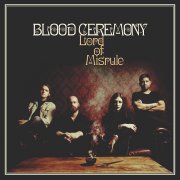 |
Lord of Misrule (2016, 44.13) ****/T½The Devil's WidowLoreley The Rogue's Lot Lord of Misrule Half Moon Street The Weird of Finistère Flower Phantoms Old Fires Things Present, Things Past |
Current availability:
Mellotron used:
Toronto's Blood Ceremony formed in the mid-2000s, 2016's Lord of Misrule being their fourth release. Stylistically, the band sit somewhere between a female-fronted Black Sabbath, Jethro Tull and countless lesser-known early '70s psych, prog and folk outfits; 'a folkier Sabbath', according to guitarist Sean Kennedy. Alia O'Brien's powerful contralto and flute work set them apart from their contemporaries, while the rest of the band refuse to do the 'standard doom thing', often turning the distortion down to 1972 levels. Highlights? Opener The Devil's Widow, the heavier The Rogue's Lot, the bit in Half Moon Street where they suddenly kick into double-time and the folky The Weird Of Finistère, although the album remains cohesive despite its (welcome) variety.
The band's British label, Rise Above, flew them in to record at East London all-analogue heaven Toe Rag; proprietor Liam Watson gave me a call to say 'Mellotron needed', so up from Kent it came. Played by Alia, yet strangely uncredited, it turns up on a few tracks, with beautiful full-on flute and string parts on Loreley, a clicky flute line opening The Weird Of Finistère, with haunting single notes throughout and vibes on Flower Phantoms, so hardly overused. All in all, an excellent effort, although little enough Mellotron to be worth it for that alone.
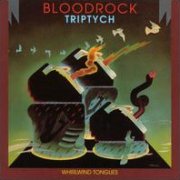 |
Unspoken Words (2000, recorded 1974, 27.27) ***/T½Gonna Help YouThe Right Time Unspoken Words Afternoon Chicken Fried Pogo Stick For the Ladies Cerberus Follow |
Current availability:
Mellotron used:
Bloodrock started off as ex-Grand Funk Railroad manager Terry Knight's new acquisition, despite having been together in one form or another since the early '60s. Their proto-metal proved popular amongst the kind of rock fans who worshipped at the altar of Grand Funk, leaving such tedious concepts as subtlety far behind. After six studio albums and various lineup changes, the band recorded Unspoken Words in 1974, although Capitol refused to release it as the band's appeal became more selective.
A double-CD set, Triptych, appeared in 2000, adding the unreleased sessions to their last two released albums, '72's Passage and the following year's Whirlwind Tongues. Was it worth it? Well, it's a bit of a stylistic mess, to be honest; opener Gonna Help You is horrid, funky pop, Chicken Fried is as backyard blues as you'd expect, while the title track and Pogo Stick are vaguely prog-lite. Maybe Capitol were right after all. The whole thing's under half an hour, anyway, making me think that recording hadn't even been completed by the time the label pulled the plug. Funnily enough, that analogy links straight back to the band's only hit, 1970's DOA...
Keys man Stevie Hill adds Mellotron to a handful of tracks, with strings on the title track, the slightly jazzy Afternoon and closer Follow, although I couldn't honestly say it adds much to the proceedings, except possibly on the last-named. I'd imagine Bloodrock obsessives probably need this for completion's sake, although the rest of us should approach with caution. It definitely has its moments, but only just enough to scrape three stars and it's probably not worth it for the Mellotron.
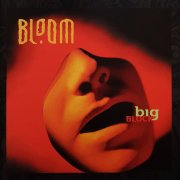 |
Big Block (1996, 44.02) ***/½ |
|
| Sidewinder Drown Sick Again Bend Somewhere Out Got No Right Big Block Slow Ones |
Thomas Edison Odds Day That I Died Magic Mountain |
|
Current availability:
Mellotron used:
Bloom hailed from Albany, NY, a grunge-lite trio whose sound, on the second of their two albums, 1996's Big Block, was perfectly acceptable, while being utterly unoriginal. It's probably at its best on the more measured Somewhere Out and the slide guitar-driven title track, but, while inoffensive, it's all a bit second-hand, I'm afraid.
Dominick Campana guests on what I presume is the Fort Apache studio M400, with dirty flutes on Bend, although, sadly, that would seem to be our lot. Bloom sat fairly and squarely in also-ran territory, so it's hardly surprising they called it a day after this album. I'm not sure the world has missed out, frankly.
 |
Hombre, Tierra y Alma (1979, 36.25) ***½/TT½Humanidad IndefensaYa No Hay Nada en la Calle El Llanto del Poeta ¿El Infierno Esta Aqui? - Parte I/Una Posibilidad/¿El Infierno Esta Aqui? - Parte II Meditacion - Parte I/Descubrir el Sentido Terrible de la Vida/Meditacion - Parte II El Verdadero Silencio - Parte I/La Muerte Renacida/El Verdadero Silencio - Parte II Por Fin He Vuelto a Ti |
 |
El Hijo del Alba (1980, 37.32) ***½/T |
|
| Poemas de Soledad Alquimista Soy La Danza del Agua El Hijo del Alba Quimérica Laxitud El Silencio de las Esferas I La Razón Natural/El Silencio de las Esferas II La Elipse/El Silencio de las Esferas III |
Fin y Principio/El Silencio de las Esferas IV Un Hombre Nuevo |
|
 |
Música Para la Libertad (1981, 36.51) ***½/TTTPesadilla de VivirEl Poder de la Libertad Añoranza Camino del Universo Tau Ceti Detenidos en la Materia Sólo Sentimiento Mágico y Salvaje |
Current availability:
Mellotrons used:
Bloque were a Spanish progressive/hard rock outfit of rather variable quality, their last release, weirdly, often quoted as being their best. Despite apparently being credited, I can hear no Mellotron on their debut, Bloque (***), at all and, in fact, the album isn't particularly progressive, being more twin lead guitar-driven hard rock. Hombre, Tierra y Alma (Men, Earth and Soul) was the follow-up and, despite the variable quality of composition, is worth hearing, although it's not the best the country had to offer. As you can see, several of the tracks are actually composites, although I can only actually hear six pieces, which should explain the slightly confusing listing above. As usual with Spanish bands, the strings largely emanate from a string synth (why??!), although Juan C. Gutiérrez' Mellotron strings turn up on Meditacion/Descubrir El Sentido Terrible De La Vida, along with a large helping of choir, including a lengthy solo section at the end. More choirs on the last two tracks and, although the flutes on the Ya No Hay Nada En La Calle/El Llanto Del Poeta sound real, I presume they're Mellotron, too, although the cello on ¿El Infierno Esta Aqui? has to be real. And those church bells sound an awful lot like Mellotron FX tapes...
Their third album, El Hijo del Alba (Son of the Sunrise) has a more 'progressive' sound on its first side, but the flip has more of the duelling guitars you can hear on their first two releases. There seems to be an actual string section (and some brass) on several tracks, particularly the linked parts of El Silencio De Las Esferas, although opener Poemas De Soledad features considerable quantities of string synth and some murky Mellotron choir. The album probably isn't quite as good as its predecessor, but still an improvement on their debut. The following year's Música Para la Libertad is, unsurprisingly, a more mainstream effort, in line with whatever progressive scene still existed in Europe in the early '80s. For all that, it's still listenable, the band's usual hard rock influences cropping up here and there alongside some halfway decent material. Gutiérrez had obviously realised just how good those Mellotron choirs sounded by this point and slapped them all over the record, with particularly effective use on the balladic Añoranza and the instrumental Tau Ceti.
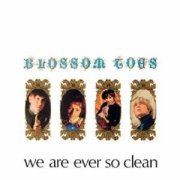 |
We Are Ever So Clean (1967, 39.55/70.00) ****/0 (T) |
||
| Look at Me I'm You I'll Be Late for Tea The Remarkable Saga of the Frozen Dog Telegram Tuesday Love is What's it for People of the Royal Parks What on Earth Mrs Murphy's Budgerigar |
I Will Bring You This and That Mister Watchmaker When the Alarm Clock Rings The Intrepid Balloonist's Handbook, Volume One You Track for Speedy Freaks (or Instant LP Digest) [CD adds: Everybody's Talking |
Look at Me I'm You (instrumental) I'll Be Late for Tea (instrumental) Mister Watchmaker (live) I'll Be Your Baby Tonight Jim Cregan interview Love is (live) Collects Little Girls (demo) Hometime (demo) Looking Up & Looking Back (demo)] |
|
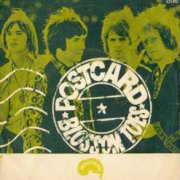 |
7" (1968) ***½/½ Postcard Everyone's Leaving Me Now |
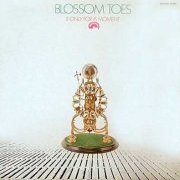 |
If Only for a Moment (1969, 43.33) ***½/½Peace Loving ManKiss of Confusion Listen to the Silence Love Bomb Billy Boo the Gunman Indian Summer Just Above My Hobby Horse's Head Wait a Minute |
Current availability:
Mellotrons used:
Blossom Toes' debut, 1967's We Are Ever So Clean, is a wonderful slice of UK psych (albeit Mellotron-free), tracks such as Look At Me I'm You, People Of The Royal Parks and Mister Watchmaker almost defining a certain kind of English musical whimsy, helped along by its almost impossibly baroque orchestral overdubs. Sunbeam's extended reissue adds a whole ten tracks, a couple of them live, including a version of the album's Love Is, complete with Mellotron strings, presumably played by Brian Godding, although how they came to have an expensive MkII on stage is unknown. An excellent single from the following year, Postcard, features a little MkII strings in the background, although that's it for Mellotron use in their psych period.
The album's follow-up, If Only for a Moment, is a darker effort all round. It actually sounds like exactly what it is; a psych group moving into heavier and more progressive territory, although in places (notably Listen To The Silence), they hark back to something more akin to their earlier sound, while the sitar on Just Above My Hobby Horse's Head is pure '67. The material is good (especially the excellent Peace Loving Man), though not classic, although I know many aficionados of the era would disagree with me; maybe repeated listens will fully reveal the album's charms.
There's very little keyboard of any description to be heard on the album and the only obvious Mellotron is a few seconds at the beginning of Peace Loving Man, probably from guitarist Brian Godding, making this about as un-Mellotronic as it's possible to be without, er, not using one at all. As a result, while this is worth hearing and is a decent document of a transitionary period in British rock, don't even think about it if you're looking for Mellotron classics, the same going for the Postcard single. Incidentally, after the band's untimely split (they'd simply 'had enough'), some of them went on to form BB Blunder, whose lone album, Workers' Playtime, was reissued, for some odd reason, as New Day, the band renamed Blossom Toes '70, although it's Mellotronically-challenged, despite rumours to the contrary.
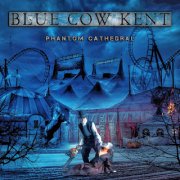 |
Phantom Cathedral (2014, 46.00) **½/T |
|
| Phantom Cathedral (intro) Clown Eraser A.D. Thunder is Coming Alias Lincoln Bravo Torah of Efva In Case of Emergency Orange Air Ancient Continents |
No Condolences for Uncle Ben Last Hurrah |
|
Current availability:
Mellotron used:
Blue Cow Kent play what is generally known these days as 'melodic rock', an amalgam of cheesy AOR, its slightly rockier '80s cousins and, sometimes, a smattering of progressive metal. Not something that your humble reviewer has a lot of time for, frankly, which isn't to say the AOR genre didn't throw up a handful of classics in its day. Their debut, 2014's Phantom Cathedral, is that oddest of things, a melodic rock concept album, although genre fans can enjoy this without referring to the concept at any point. Best tracks? Probably In Case Of Emergency and Ancient Continents, despite its intro sounding like the theme tune to a third-rate HBO science fiction series, but the bulk of the album does that heavy-yet-not thing, with acres of squealing guitar solos for no especially good reason.
Catweazle's Michael Thörne plays what sounds like real Mellotron (his own?) on Thunder Is Coming, mostly choirs, with a burst of strings towards the end. So; genre fans should enjoy, the rest of us won't, not worth it for the Mellotron.
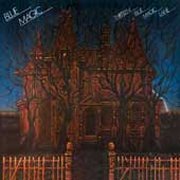 |
Thirteen Blue Magic Lane (1975, 37.41) **½/½The Loneliest House on the BlockChasing Rainbows Born on Halloween Haunted (By Your Love) I Like You Magic of the Blue We're on the Right Track Stop and Get a Hold of Yourself What's Come Over Me |
Current availability:
Mellotron used:
Thirteen Blue Magic Lane was Blue Magic's third album, carrying on their smooth Philly soul tradition, incorporating members of the city's legendary MFSB, which, despite their public protestations, didn't stand for 'Mother Father Sister Brother', although the 'Mother' bit was right. While the album's an efficient example of the style (least gruesome track: Magic Of The Blue), if you loathe smooth soul as much as I do, you're really, really, not going to get anything from this. Amusing note: Born On Halloween starts with what sounds like exactly the same wolf howl as the Blue Öyster Cult's Baby Ice Dog, from 1973's Tyranny & Mutation, although it probably isn't.
For some reason, one of the album's four keyboard players, Ron "Have Mercy" Kersey, Carlton Kent, Dexter Wansel or Ted Mills, plays Mellotron string stabs on Stop And Get A Hold Of Yourself, rather than the string section who play on the rest of the record. Is it to any great effect? Not really, no; not sure why they bothered. Anyway, a perfectly acceptable record of its type, assuming you like its type. I don't.
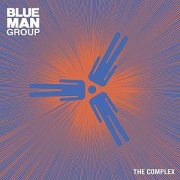 |
The Complex (2003, 54.05) ***/T |
|
| Above Time to Start Sing Along Up to the Roof Your Attention Persona Piano Smasher White Rabbit |
The Current Shadows, Pt. 2 What is Rock The Complex I Feel Love Exhibit 13 |
|
Current availability:
Mellotron used:
The Blue Man Group, on the offchance that you haven't encountered them, are more of a franchise than a band and more of a theatrical presentation than a 'proper' gigging outfit. Created by three New Yorkers, the 'Blue Men' are three anonymous actors/musicians who 'play' various seemingly-improvised equipment made from plastic tubing and the like, backed by a regular band. As you might expect, the whole shebang is highly visual, making recordings slightly redundant, although their 2003 DVD, The Complex Rock Tour Live, makes perfect sense. In the way that a stage show involving three people (not always men, apparently) in bright blue makeup and latex bald wigs can be said to make sense, of course.
The Complex is a slightly bewildering mixture of rock, comedy and percussive overkill that works vastly better with the visuals, at its best when utilising some of the instruments created for the show. Time To Start opens with a rhythmic pipework part, before Todd Perlmutter's ironic narration on 'rock concert movement' kicks in, with similar on Up To The Roof and their rather strange version of Jefferson Airplane's White Rabbit, amongst others. Speaking of covers, I suppose it was an obvious one to tackle, but their version of Donna Summer's iconic I Feel Love is pretty decent, fitting their remit well. The album also features various guest singers, including Tracy Bonham, Dave Matthews and Gavin Rossdale. You know, from Bush. Bush? UK grunge-lite merchants who made it big in the States? Oh, never mind.
Mellotron cellos are credited merely to 'Blue Man' and, given that it's an unusual sound to use sampled, I suppose there's a chance it's real. It's only obvious on a couple of tracks, with the higher registers coming into play on Persona and a part on Exhibit 13 that I can only describe as 'dusty'. So; a rather odd album that falls a bit flat without its accompanying visuals, but at least you get to hear their music without all the brouhaha that goes with the live version. Little Mellotron cello and no guarantee it's real, but worth hearing if you're buying the album anyway.
See: Tracy Bonham
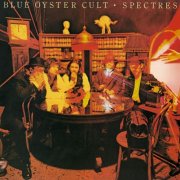 |
Spectres (1977, 40.35) ****/T |
|
| Godzilla Golden Age of Leather Death Valley Nights Searchin' for Celine Fireworks R.U. Ready 2 Rock Celestial the Queen Goin' Through the Motions |
I Love the Night Nosferatu |
|
Current availability:
Chamberlin used:
"Ladies and gentlemen, the amazing BLUE ÖYSTER CULT!" BÖC's fifth studio outing is in the same ballpark as the previous year's Agents of Fortune, usually (and erroneously) described as their 'best album' due to the inclusion of FM staple (Don't Fear) The Reaper; I'm sorry, but since when did one total classic and a handful of other good tracks make an album an artist's 'best'? Anyway, Spectres features three killer tracks, several 'good' and a couple of 'so-so' ones, with the deathless Godzilla, biker-gang death-match narrative The Golden Age Of Leather and the creepy Nosferatu being the classics.
According to an article in fan club magazine Morning Final, the band 'found' a Chamberlin in the studio (probably the Record Plant in New York) during the recording of the album and bassist Joe Bouchard, an accomplished pianist on the quiet, laid down swathes of Chamberlin violins on his own composition, closer Nosferatu. A mock-horror shlock-gothic masterpiece, it's the last of the album's three 'vampire songs', being a fairly straight retelling of Bram Stoker's original tale. This track highlights the difficulty in spotting the difference between Mellotron and Chamberlin strings; I had it down as a 'Mellotron track' for years until learning otherwise and it's difficult to tell even now, although the sound has a certain quality that doesn't ring true for the Mellotron. Whatever, it's a great piece of music and a superb example of the Chamberlin in action.
I'd cautiously recommend the album, but for beginners to the band, go for '73's Tyranny & Mutation (*****) or the following year's stunning Secret Treaties (*****) instead.
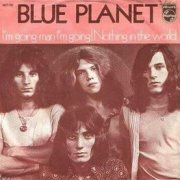 |
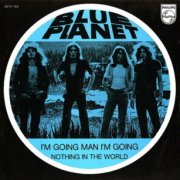 |
7" (1970) ***½/TTT I'm Going Man, I'm Going Nothing in the World |
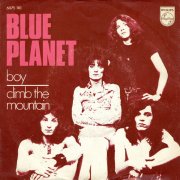 |
7" (1971) ***½/TT Boy Climb the Mountain |
Current availability:
Mellotrons used:
Blue Planet are one of those bands who appeared in the late '60s/early '70s, released a handful of singles and disappeared, seemingly without trace. I'm Going Man, I'm Going was the first of their three seven-inchers and is, rather surprisingly, a hard rock number in that 'heavy pop' style that was briefly popular at the time, vaguely comparable to Frijid Pink's version of House Of The Rising Sun, or The Rattles' The Witch, both released the same year. Possibly due to an inability to afford a string section, an unknown musician slaps a huge chunk of raw Mellotron strings all over the track, improving something that wasn't at all bad to start with. Can you get hold of this? Odd tracks like this are notoriously hard to track down, but it's available on a double CD of Dutch hits released in 1999, titled Pop Van Eigen Bodem.
They followed up with Boy b/w Climb The Mountain, another pair of decent hard rock numbers; why were this band not given the budget for an album? We're probably hearing Dutch Phonogram Studios' legendary M300 here, with (once again) fat slabs of strings on the 'A' and more background ones towards the end of the flip. Their final single veers towards pop and appears to be Mellotron-free, but these two are both worth your time and effort.
 |
Tremolo (1997, 63.29) **½/T |
|
| Moon & Tree Shed My Skin No Miracle, No Dazzle Falling Down Blue I Could Never Be That Man Beautiful Blue Fallen From Grace Me & Baz |
Disappear It Could Happen to You Dragging on Brother André's Heart Frogs' Lullaby Graveyard |
|
Current availability:
Mellotron/Chamberlin used:
Blue Rodeo are one of Canada's biggest country outfits (not much 'alt' here, to be honest), although they've never managed to break through internationally, i.e. in America. Tremolo (note correct spelling) is their seventh album in a decade - pretty good going by modern standards - and is best described as lightweight modern country-rock, tracks like opener Moon & Tree, the slightly rockier No Miracle, No Dazzle and the rootsy I Could Never Be That Man defining the record, although vaguely punky closer Graveyard is well out of character.
James Gray plays Mellotron and Chamberlin, with what sound like Chamby strings on Fallen From Grace, while something tells me the pedal steel on It Could Happen To You's also from the Chamberlin. The strings on Dragging On sound real, although there's something else in there (muted brass?) which has to be tape-replay, although the voices on Beautiful Blue are real, as are the violins on Disappear and several other tracks. Mellotron? No idea, squire.
See: Samples etc.
 |
The Executioner's Lover (2014, 85.53) ****/½ |
|
| Half Life Love Everlasting The Breathing World Out of the Stars and Into the Sand The Parting of the Ways The Horror Something to Hide From Each Other Blood and Guts |
Aging Madonna They Know Not What They Do An Impossible Task The Executioner's Lover What Boiling Arms of Whales and Babes The Victim The Winds That Drug the Farm The Moon Stops Speaking |
|
Current availability:
Mellotron used:
Glaswegians The Blue Ship's 2014 debut, The Executioner's Lover, is far from easy to describe. Brecht & Weill meet Sparks? Jacques Brel gets duffed up by Cardiacs? Imagine (if you can) a Parisian between-the-wars ensemble, complete with string section and accordion, playing a wonderfully overwrought version of what Schoenberg might have attempted had he been forced to write showtunes. Er... Not really capturing it, am I? They actually remind me of an utterly obscure mid-'90s band fantastically called Ennui, who hovered around the London circuit for a while, all camp theatrics and arch grimaces, but that isn't likely to help, either. This is what YouTube's for, folks.
Highlights? Opener Half Life gives you some idea of what you're letting yourself in for, Out Of The Stars And Into The Sand's near-nine minutes possibly defines the ensemble's sound, while Something To Hide From Each Other is a personal favourite, possibly due to band leader Paul Napier's rare use of guitar, although I have no issues with the album's chief instrumentation. Incidentally, disc two consists of nineteen minutes of borderline-atonal music for a small string section. Excellent composition, but, unless you've been exposed to twentieth-century classical music, approach at your peril.
Napier is credited with Mellotron, but all I can hear is a distant flute part at the end of The Horror that, er, challenges conventional tonality, shall we say, clicky enough to be real. The Executioner's Lover is not an album for the faint-hearted, let alone Marillion fans. Italian label AltrOck should be lauded for releasing a record as far out on the margins as this; let's hope their faith in their audience pays off. Worth your time and hard-earned.